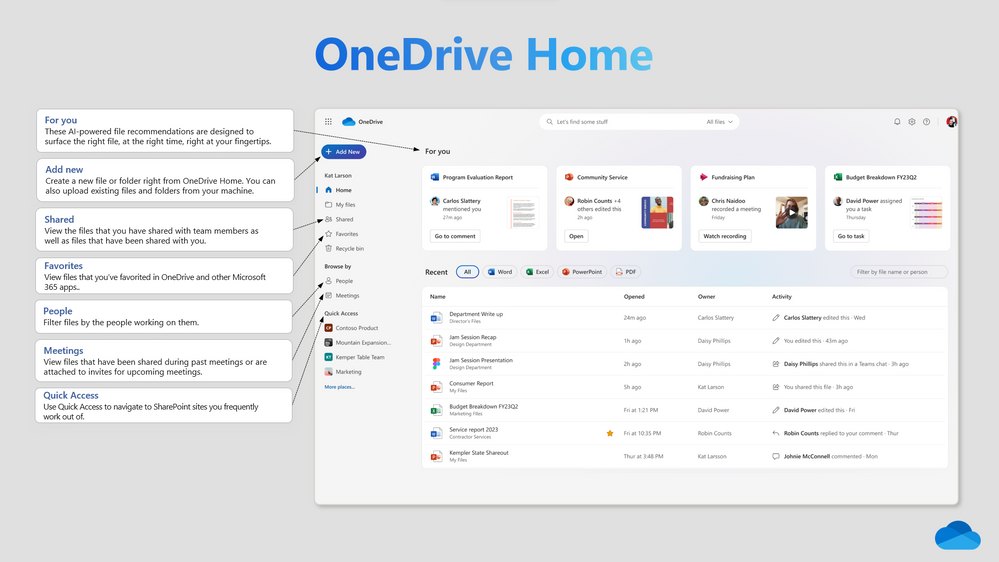Microsoft unveils its next generation of OneDrive with AI Copilot that intrudes on your files

Microsoft has unveiled its next generation of OneDrive as part of its effort to bring Copilot to the cloud storage service. The update was a major overhaul since OneDrive first launched as a cloud storage provider a few years ago. Microsoft can’t seem to stop injecting AI Copilot into various aspects of its app ecosystem, with the latest move being the integration of Copilot into OneDrive’s next generation, which aims to steer users toward its web interface.
In a presentation covering both consumer and business editions of OneDrive, Jeff Tepper, Microsoft’s President of Collaborative Apps and Platforms, highlighted that OneDrive has evolved from its origin as a simple cloud storage solution to become the central hub for users’ file management within Microsoft 365. Beyond storing and safeguarding files, the new OneDrive enhances sharing, collaboration, and file security. Tepper also added that OneDrive has gained widespread adoption globally, hosting trillions of files and seeing the addition of nearly 2 billion files daily.
“Today, we’re officially unveiling the next generation of OneDrive where all your files are at your fingertips. The next generation of OneDrive includes new file views, governance controls, creation tools, and Copilot to help you quickly search, organize, and extract information from your files. And, these new experiences aren’t just “in” OneDrive, they are coming to Teams and Outlook for a consistent and rich file experience across Microsoft 365,” Microsoft said.
During the October 3, 2023 event titled: “Microsoft OneDrive: The Future of File Management is Here,” Teper and the OneDrive product team showcased the future of file management within Microsoft 365. The event featured the latest improvements to OneDrive, promising faster file access, enhanced organization, seamless collaboration, and upgraded file security across Microsoft 365. Additionally, the presentation provided insights into the integration of Copilot into OneDrive and introduced new photo search capabilities.
Teper and the OneDrive product team also presented the redesigned home experience in OneDrive called OneDrive Home which serves as a gateway for business customers to quickly access and retrieve their files no matter where they live within their organization. But one slightly worrying panel on OneDrive Home is captioned “For You,” (shown below) which presents files that Microsoft’s AI deems relevant. One can only hope that administrators stay vigilant to ensure that nothing unintended appears here.

OneDrive Home
Other views include “Meetings,” which displays upcoming and past meetings, along with related files and recordings; “People,” which organizes files by collaborators; and “Shared,” listing files shared with the user. Users can also customize folder colors, mark favorites, and create shortcuts.
While Microsoft introduced this new design for work and school environments back in May, it’s the upcoming features that have caught the attention of customers. Notably, the ability to launch desktop apps from files in the browser via “Open-in-app” is scheduled for a December rollout, offering convenience for some users. However, the File Explorer version of OneDrive may remain the preference for many.
The integration of OneDrive into Teams and Outlook will simplify file linking for users, with integration into the Windows Outlook app or web version slated for December. However, the most intriguing aspect is the offline functionality.
Currently, desktop synchronization allows certain files to be kept locally and others in the cloud. Microsoft plans to extend this capability to the browser, enabling users to designate files or folders for local availability via OneDrive for the Web. Furthermore, users will be able to open and work on files designated for offline access in the browser, even without an internet connection.
Meanwhile, Microsoft also said that it is planning to introduce Files On-Demand for Web and Offline mode in the browser, expected to be available in early 2024. Additionally, Copilot capabilities are set to make their way into OneDrive, aimed at helping users locate files and maintain organization.
However, there is some concern as Copilot can autonomously move files and create folders based on its interpretation of user instructions. The integration of Copilot into OneDrive is slated for December, but it will require a Microsoft 365 Copilot license for queries regarding individual files. The rollout dates for other Copilot skills are currently unspecified.
To prevent inadvertent file access, Microsoft will be introducing security tools designed to limit file access, establish precise conditional access policies, and facilitate the transfer of OneDrive accounts between tenants. These enhancements, including administration reports, are set to be available for preview starting in January 2024 as part of Microsoft Graph Data Connect for SharePoint.
Below is a video of the entire event.




